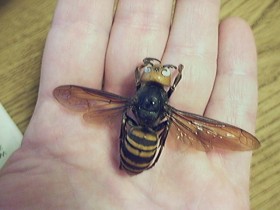Beware! Giant Asian Hornets Spotted in U.S. Kill Dozens in China
 Even animals and insects are not spared from the effects of climate change. Scientists said there is a global increase in the number of insects due to climate change. Some insects are apparently taking advantage of rising temperatures like the giant Asian hornets that have been reportedly killing people in China. Reports also said they killer giant Asian hornets were spotted in the United States as early as July 2012.
Even animals and insects are not spared from the effects of climate change. Scientists said there is a global increase in the number of insects due to climate change. Some insects are apparently taking advantage of rising temperatures like the giant Asian hornets that have been reportedly killing people in China. Reports also said they killer giant Asian hornets were spotted in the United States as early as July 2012.According to a report from The Guardian, hundreds were injured and 28 died from giant hornet attacks in China. The giant Asian hornets also known scientifically as Vespa mandarinia were allegedly chasing people and going as far as hundreds of metres. Victims of these killer hornets reported to be stung “as many as 200 times.”
When a person is stung by a giant Asian hornet, the venom can cause anaphylactic shock. It can also cause kidney damage.
A giant Asian hornet queen is almost the same as the width of a person’s hand but the average Vespa mandarinia should not be ignored. Its stinger measures an average of about quarter of an inch.
Chinese officials said that almost 600 or 583 people have been stung by giant Asian hornets since July 1.
A victim told authorities that the more a person runs, the more hornets will pursue their victims. Local reports said one victim sustained damage to his kidneys that his urine came out the colour of soy sauce.
Experts said several reasons could have triggered the increasing reports of giant Asian hornet activity. China is currently experiencing dry and hot weather. When a hornet’s nest or population is disturbed due to human activity, they will attack in swarms.
According to Honeybee Conservancy, a non-profit organisation, the giant Asian killer hornets are carnivorous and formidable killers. The young hornets are fed with larvae from other insects. The hornet’s sting contains a powerful neurotoxin which can dissolve human tissue based on the Guinness Book of World Records.
The recent giant Asian hornet attacks prompted China’s Angkang city government to make an emergency video call to attend to the needs of locals. The city’s vice mayor has announced that he will put more investment in establishing a regional hornet control.
You can return to the main Market News page, or press the Back button on your browser.

